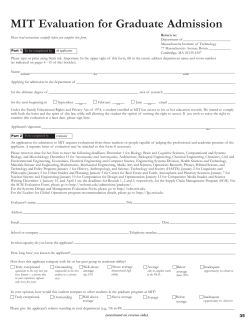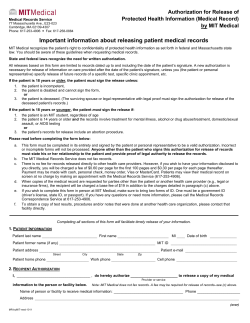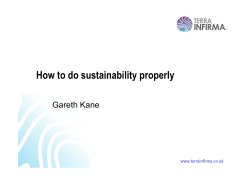
Manager`s Performance Development Toolkit
MITHumanResources Performance Development AToolkitforManagers TableofContents TheVisionforPerformanceDevelopmentatMIT……………………………………..2 Whatdowemeanby"Baseline"and"Best"Practices?...........................................3 MITPerformanceDevelopmentImprovementProcess…………………………….4 OngoingFeedback…………………………………………………………………………………..5 PerformanceReviews……………………………………………………………………………..9 GoalSetting/DevelopmentPlanning……………………………………………………….12 Accountability……………………………………………………………………………………….13 EmployeeRecognition…………………………………………………………………………...14 hrweb.mit.edu/performance Page1 TheVisionforPerformanceDevelopmentatMIT MITiswidelyknownasanemployerdeeplycommittedtothegrowthandsuccessofevery employee.AtMIT,honestcommunicationandfeedbackbetweenmanagersandemployees areeverydayevents,anintegralfacetofMIT'sexcellence.MITisseenasaworld‐class workplace. ThegraphicbelowillustratesthefivecomponentsofPerformanceDevelopment. hrweb.mit.edu/performance Page2 Whatdowemeanby"Baseline"and"Best"Practices? StartwithBaseline Eachactivityhastwolevelsofcompletion:BaselineandBestPractices.Baselinepractices arejustthat—baseline.Theyrepresentaminimumstandardforeachmanagerandeach department.MostBaselinepracticescanbeimplementedbyanindividualmanagerwith directreports. WeencouragemanagerstoreviewtheBaselinePracticesineachofthefiveperformance developmentcomponentsandassessyourowncurrentpractices.Youmayalreadybe doingsomeoralloftheseactivities.Ifso—greatwork! MovetowardBestPractices Afterthisassessment,yournextstepcouldbetosetamilestoneforimprovement.Which newactivitiesmightyouaddtomoveclosertoBestPracticesinanyarea?Wesuggest implementingonlyoneortwonewactivitiesatatime.Forideasorassistance,contactyour HumanResourcesOfficer. DifferencesbetweenBaselineandBestPractices ThedifferencesbetweenBaselineandBestPracticesvary.SometimesBestPractices representamorefrequentormoredetailedversionoftheactivityshownontheBaseline list.SometimesBestPracticesrepresentahigherlevelofskillsinanactivity.Insomecases BestPracticescanonlybefullyimplementedwiththecommitmentandinvolvementof departmentalleadership. MITPerformanceDevelopmentImprovementProcess WhatisthePerformanceDevelopmentImprovementProcess? Adefinedsetofbaselineandbestpracticesforeachofthefivecomponentsof performancedevelopment Asimpleprocessandsometoolstohelpdepartmentsmovefromtheircurrent performancedevelopmentpracticestowardthebestpractices AneffortdrivenbythedepartmentandsupportedbyHR Aprocessinwhichunderlyingobstaclestoachievingbestpracticesareidentified andaddressed hrweb.mit.edu/performance Page3 ThePerformanceDevelopmentImprovementProcess ForMoreInformationaboutthePerformanceDevelopmentImprovementProcess ThePDIisfacilitatedandsupportedbythedepartment'sHumanResourcesOfficer(HRO) and/orOrganizationDevelopmentConsultant(ODC)(oed‐request@mit.edu).Please contactyourHROorODCformoreinformation. hrweb.mit.edu/performance Page4 OngoingFeedback Feedbackisafocuseddialoguebetweenamanagerandanemployee,amethodofsharing informationandperspectivesaboutperformance.Thegoalofongoingfeedbackisto identifywhereperformanceiseffectiveandwhereperformanceneedsimprovement. Givingandreceivingfeedbackisatwo‐waystreet;boththemanagerandtheemployee shouldbeproactivebyfrequentlyseekingoutandprovidingfeedback. BASELINEPRACTICES a. Deliberate,plannedconversationsaboutperformanceoccurbetweenmanagerand employeeatleasttwotimesperyear,includingtheannualreview BESTPRACTICES(BaselinePracticesplus...) b. Candidfeedbackisgivenfrequentlyandfocusedonperformancesuccessesorhow toimproveperformance c. Individualperformancegoalsarerevisitedmorethanonceayear d. Whereapplicable,groupsgetaggregatefeedbackongroupgoals TheBestPracticeDifference TheadditionalstepsinBestPracticesarebothqualitativeandquantitative.Theupgrade fromBaselinePracticesisthatfeedbackistiedexplicitlytoperformance.Inaddition,Best Practicesfeedbackiscandidandgivenfrequently.Performancegoalsarerevisitedduring thecourseoftheyearsothattheemployeeknowsthatheorsheisontrack,orknowswhat todotogetbackontrack. Someworkgroupsdonothavegroupgoals;forthosethatdo,BestPracticemeansthat everyonegetsfeedback—intheaggregate—aboutprogresstowardthosegoals. Effectivefeedbackshould: Betimely(notmonthsaftergoodorproblematicsituation) Bespecific(identifyimpactsoreffectsofemployee'sactions) Bebehavior‐based(focusonacts,notattitudes) Bemotivatedbydesiretohelp,notpunish Example:"Intoday'smeeting,InoticedyoustartedtotalkwhenBobwasstillspeaking. YoudidthisagainwhenJoanwastalking.Theseinterruptionsmadeithardforustohear theirideas.Idon'tthinktheyhadachancetofinishwhattheywantedtosay.Iknowyou areveryenthusiasticaboutthistopic,butitwouldbebetterifnexttimeyouwouldmake surethepersontalkingisfinishedbeforeyoustart.Thatwaywe'llallgettohear everyone'sideas." hrweb.mit.edu/performance Page5 HowGoodAreYouatGivingFeedback:ASelf‐Assessment Thisself‐assessmentwillhelpyoucheckyourknowledgeandassumptionsaboutgiving feedback. Circletheletterthatbestrepresentsyourthinkinginmostcasesthatinvolvegiving feedbacktosomeoneelse. 4=Stronglyagree 3=Somewhatagree2=Somewhatdisagree1=Stronglydisagree 4 3 2 1 a. IfIwait,thesituationwillprobablyresolveitself. 4 3 2 1 b. Idon’tliketogetcriticism,soothersmustfeelthatwaytoo. 4 3 2 1 c. Icriticizeindirectlybyusingsarcasmorjokes. 4 3 2 1 d. Ican’tseemtofindtherighttimetogivefeedback. 4 3 2 1 e. Idon’thavetimetogivealltheconstructivefeedback that’sneeded.It’seasierandquickertopickuptheslackmyself. 4 3 2 1 f. I’munsureabouthowtheotherpersonwillrespond. 4 3 2 1 g. I’mnotperfect,sowhoamItojudgeanybodyelse. 4 3 2 1 h. Givingmybossnegativefeedbackmaybeusedagainstme. 4 3 2 1 I. I’veletthesituationgoforsolongthatsayingsomethingnow seemsinappropriateorfutile. 4 3 2 1 j. I’mnotcertainwhetherIcankeepmyemotionsincheck. 4 3 2 1 k. Ishouldn’thavetogivepeoplefeedbackforsomethingthat’s expectedintheirjobs. 4 3 2 1 l. Idon’tgetanyfeedbackfrommyboss(es),soIdon’thavetogive ittoanyoneelseeither. 4 3 2 1 m. IfIgivepositivefeedbackforgoodwork,itmightmakeitharder tocriticizethatperson’sworkwhenit’sneededlater. 4 3 2 1 n. IfIgivepraiseforanindividual’s(orteam’s)work,itmayappear thatI’mplayingfavorites. 4 3 2 1 o. IfIprovidenegativecriticismtosomeone,thatperson’sattitude ormoralemightgetworse. 18 or fewer = superior; 19 -34 = thereÕs a little room to grow; 35 50 or more = needs lots of work hrweb.mit.edu/performance -49 = needs improvement Page6 GivingEffectiveFeedback:a4‐partModel PositiveFeedback Yesterdaywhen Isawyouputdownthebudgetyou Shestoppedbylatertotellme ProfessorSmith hadbeenworkingtogetdoneandgo howhelpfulyouhadbeen.Your stoppedbyyour toourwebsitetogetsome flexibilityandwillingnesstogo office... outofyourwaytohelpreally information.Youthengotupand walkedherfromyourofficetowards modelourcommitmentto customerservice! theofficethatcouldhelpher. Ireallyappreciatethat you'llcontinuetodo this.Itshowsyour commitmentto customerservice. CorrectiveFeedback Atourstaff EverytimethatSusie meeting spoke,youturnedaway yesterday… andstartedtalkingwith Bob,oryouopenedyour laptopandcheckedyour email. Fromnowon,duringstaff IsawthatSusienoticedthis.After the3rdor4thtimeyoudidthis,Susie meetingspleasefocusyourfull stoppedsayinganythingfortherest attentiononeachspeakersothat everyonecontinuestoparticipate ofthemeeting.Susieknowsalot andweworkmoreeffectivelyasa aboutourtopic;Ithinkwereally team. missedoutonherideas. hrweb.mit.edu/performance Page7 GivingFeedbackforaRecurringProblem Step1:RaisetheIssue Identifytheareaofconcern Example:"Ineedyourhelpwith..."or"Iamconcernedabout..." Step2:DescribetheSpecifics Avoidaccusationsanddefensivenessbyusingthe4‐partmodelforeffectivefeedback Encouragetheotherpersontodiscusshowtheyfeelbyusingopen‐endedquestions Summarizetheotherperson'sremarkstoconfirmunderstanding/perception Example:"Whenthishappens...theresultis...andIfeel...."Or,"Whydoyouthinkthat occurred?" Step3:RequestaChangeinBehavior Mutuallydiscusswaystoeliminatetheproblem Seektheotherperson'ssuggestions,thoughts,andgoals Makesuggestions Example:"Inthefuturehowcanwe...?"Or,"Here'swhatIwouldsuggest..." Step4:AgreeonanActionPlan Summarizewhatyoudiscussed Provideanopportunityfortheotherpersontomakeanyfinalsuggestionsorcomments Setatimeandplaceforfollow‐upandevaluationofthechanges Closethediscussiononapositive,upbeatnote Step5:FollowUp Ifthesituationwarrantsit,keeparecord Evaluatehowyouhandledthediscussionandwhatyoucoulddodifferentlyinthefuture Setupasystemforfollow‐through(e.g.,setcheck‐indatesoncalendar) Continuetoprovideassistancetotheotherpersonasneededandappropriate Providefeedback WhentoPutItinWriting Whenit'ssomethingyoushouldremember(positiveornegative) Atthefirstsignofaproblem Tokeeptrackofarecurringproblem Whenyoumighttakefutureaction(positiveornegative) Sothatyoucansharedocumentationwiththeemployeetoclarifyexpectations hrweb.mit.edu/performance Page8 PerformanceReviews Formalperformancereviewsareacrucialpartoftheongoingdialoguebetweenmanagers andtheiremployees.Theobjectivesofthereviewconversationaretomakesurethatthe employeeandmanagershareacleardefinitionofthejob,anunderstandingofperformance expectationsfortheposition,andanassessmentoftheemployee'sperformance. BASELINEPRACTICES a. Managerandemployeereviewjob/positiondescription,updateasneeded,discuss pastyear’sperformance b. Reviewiswritten;employeeisinformedthatitwillbepartofhis/herMIT personnelfile;employeesignsandreceivesacopy. a. b. c. d. e. f. BESTPRACTICES(BaselinePracticesplus...) Managerencouragesemployeetoshareresponsibilityinareciprocalprocess Processbeginswithwrittenself‐appraisalbyemployee Managersolicitsfeedbackfromcolleagues,customers,anddirectreports Everyemployee,includingseniormanagers,receivesareview Departmentprovidestrainingforemployeesabouttheirrolesandresponsibilities inperformancedevelopment Departmentmanagementselectsreviewformsthataremeaningfulandconsistent withindepartment Multi‐raterReviews Performancereviewsthatincludefeedbackfromanemployee'scustomersandcoworkers canbeparticularlyhelpful.Whilecompilingthedatafromamulti‐raterreviewrequires someadditionaltimefromthemanager,thesereviewsmayidentifyexcellentperformance orareasforimprovementnotvisibletothemanager. HowtoConductaMulti‐raterPerformanceReview 1. Developasetofthreetofoursimplequestionstobesenttotheemployee's customers,coworkers,and/ordirectreports.OR,foramorecollaborativeprocess, asktheemployeetosuggestsomepossiblereviewquestions.Seesamplequestions thatcanbeusedinamulti‐raterreview. 2. Identifyspecificindividualstobeaskedforfeedback,andgivetheemployeethe opportunitytosuggestnamesaswell.Becausesomemulti‐ratersmaynotbeableto participate,feedbackshouldberequestedfrom3to5individualsineachcategory (e.g.,customers,coworkers,directreports).Thisensuresthattherewillbeample hrweb.mit.edu/performance Page9 feedbackandthatcommentscanbeconsolidatedforreportingwithoutattribution. 3. Sendrequestsforfeedbacknolaterthanthreeweeksbeforethereview conversationwitharequestforcompletionwithintwoweeks.Thisgivesthe manageroneweektopreparefortheperformancereviewconversation. 4. Haveallfeedbacksentdirectlytothemanagersothatthecommentscanbe compiledwithoutattribution.Toencouragecandor,remindratersthattheir feedbackwillbepresentedtotheemployeewithoutattribution. SampleTimeline Startbyworkingbackwardfromtheproposedconversationdate.Forexample,ifthe reviewconversationisscheduledforSept.2,thetimelineshouldbeasfollows. Aug.1 Managerandemployeedeterminewhowillbeaskedforfeedback. Managerandemployeediscusswhattopicsthequestionsshouldaddress. Aug.5 ManageremailsindividualsandrequestsfeedbackbyAug.19. Aug.19–26 Managercompilesfeedbackreceivedfrommulti‐ratersandidentifieshighlights (trends,examplesofoutstandingperformanceorexamplesofareasfor improvement). Managerpreparesforreviewconversation. Aug.26 Performancereviewconversationtakesplace.Developmentplaniscreatedfor employee. Sept.2 Employeeandmanagercompleteanysummarydocumentsanddevelopmentplans. Employeereceivesacopyofmaterials;managerkeepsacopyindepartmentfiles. Note:Thisannualperformancereviewprocessdoesnotfallwithinthestandardtimelinefortheannualsalary reviewprocess. hrweb.mit.edu/performance Page10 SampleQuestionsforMulti‐RaterReviews ForCoworkers Whatwouldyousayare(person'sname)areasofexpertise? Whatskills/attributesdoes(person'sname)bringtotheteam/area?Arethere thingsyouwishhe/shewoulddolessofordodifferently? Howwouldyoucommenton(person'sname)professionaldevelopmentover thepastyear? Ifyouwerecreatingadevelopmentplanfor(person'sname)whatwouldyou include? ForCustomers Whatarethetwoorthreemosthelpfulthings(person'sname)hasdonein his/herworkwithyourarea/group? Whatdoyouwishhe/shehaddone/woulddomoreof? Whatdoyouwishhe/shehaddone/woulddolessof,ordodifferently? Ifyouweredoingthisperson'sreview,whatmightyourecommendforhis/her professionaldevelopment? ForDirectReports Whatarethetwoorthreemosthelpfulthings(person'sname)hasdoneto contributetoyoursuccessfulwork? Whatdoyouwishhe/shehaddone/woulddomoreof? Whatdoyouwishhe/shehaddone/woulddolessof,ordodifferently? hrweb.mit.edu/performance Page11 GoalSetting/DevelopmentPlanning BASELINEPRACTICES a. Anemployee'sperformancegoalsanddevelopmentplansare: o createdbythemanagerandemployee o writtenand,wherepossible,measurable b. Performancegoalsanswerthequestion"Whatisexpectedoftheemployeein his/herjob/position?" c. Developmentgoalsanswerthequestion"Inwhatareasandwaysshouldthe employeedevelopforthefuture?" d. e. f. g. h. BESTPRACTICES(BaselinePracticesplus...) Performancegoalsarealignedwithbothjob/positiondescriptionanddepartment goals Developmentplansincludemorethantraining(e.g.,specialprojects,committee assignments,mentoringrelationships) Achievementofperformancegoalsisusedtodrivenextassignments Employeeandmanagerconsidercurrentperformance,individualdesires,and departmentneedsindevelopmentplans Whereapplicable,departmentgoalsarecommunicatedtothedepartmentasa wholeinatimelyfashion IntegratingPerformanceandDevelopmentGoals hrweb.mit.edu/performance Page12 Accountability Accountabilitybybothindividualmanagersanddepartmentalleadershipisakeyfactorin implementingrobustperformancedevelopmentpractices.Inastrongperformance developmentenvironment,managershavetwotypesofaccountability: Showingacommitted,ongoinginvolvementintheperformancedevelopment process—especiallybyhelpingemployeesreachtheirgoalsandholdingthem accountablefordoingso. Usingtheannualsalaryreviewallocationtoaccuratelyreflectanemployee's performanceandprogresstowardgoals. Managersanddepartmentalleadersshouldplaceasmuchimportanceonperformance development(managinganddevelopingpeople)astheydomanagingbudgets,space,and projects.Ifyourmanagerdoesn'taskyouaboutyourperformancedevelopmentactivities, youcanbringitupbysayingsomethinglike,"Iconsiderthisoneofmykeyresponsibilities. I'dliketokeepyouinformedaboutperformancedevelopment." Employeessharetheresponsibilityby: Doingtheirbestwork Strivingtomeetorexceedexpectations Informingtheirmanagersofroadblocksortheneedforassistance BASELINEPRACTICES a. Managersareheldaccountablebytheirmanagersforprovidingup‐to‐date job/positiondescriptionsandannualwrittenreviewsforeachoftheirdirectreports b. Accountabilityforperformancedevelopmentisreinforcedbyseniormanagement duringthemanager’sownannualperformancereview c. Annualsalaryreviewincreasesaresupportedbytheannualwrittenreview BESTPRACTICES(BaselinePracticesplus...) d. Seniormanagersholdalldepartmentmanagersaccountableforprovidingongoing feedbackanddevelopmentplans e. Departmenttrackscompletionratesforperformancedevelopmentprocess f. Departmentdifferentiatesbetweenindividualannualmeritincreasesbasedon performance g. Departmentcommunicatescriteriaforincreasestoeachemployee h. Departmentprovidesmanagerswithappropriatetraininginperformance development hrweb.mit.edu/performance Page13 EmployeeRecognition Recognitionisessentiallypositivefeedbackthatletsemployeesknowtheyarevaluedand appreciatedbytheircoworkersandtheorganization.Tohavethegreatestimpactinthe workplace,recognitionactivitiesshouldalsoreinforceandencourageworkthatadvances employee,departmental,and/orinstitutionalgoalsandvalues. BASELINEPRACTICES a. Departmenthaswell‐definedandpromotedrecognitionprogramthatisvisiblysupported bymanagement b. Bothindividualandteamperformancearerecognized c. Managersuseappropriaterecognitiontoreinforcegoodperformance BESTPRACTICES(BaselinePracticesplus...) d. Managersuserecognitiontoreinforcedepartmentand/oremployeegoals e. Departmentprovidesacontinuumofrecognitionactivitiesfrominformalday‐to‐dayto formalawardevents f. Departmentawardscriteriaarealignedwithdepartmentgoalsandvalues g. Groupsocialeventsandawardsareusedtoenhance/deliverexplicitrecognitionmessage EmployeeRecognitionIsEveryone'sResponsibility WhiletheInstituteasawholeandindividualdepartmentsareresponsibleforproviding resourcesandprogramsforrecognitionactivities,employeerecognitionisfundamentally aboutrelationships.Employeeswanttheircontributionsandeffortstobeacknowledgedby thosetheyworkwithonaday‐to‐daybasis,includingmanagersandpeers. Infact,employeesaremostsatisfiedwhenrecognitioncomesfromablendofsources. ©CindyVentrice2005MakeTheirDay:EmployeeRecognitionthatWorks Employeesalsoreportthattheywanttoberecognizedbyoneofthesesourcesinsomeway onceeverysevendays! hrweb.mit.edu/performance Page14 Fortunately,recognitioncantakemanyforms: Thanks Praise Respect Jobordevelopmentopportunity Beingincludedindecisionmaking Training Safeworkenvironment Therighttoolstodothejob Prideinworkingforanorganizationwithameaningfulmission Awards Forhelpwithemployeerecognition,seeMIT'sRewards&Recognitionprogramforbest practices(http://hrweb.mit.edu/rewards). hrweb.mit.edu/performance Page15
© Copyright 2025









